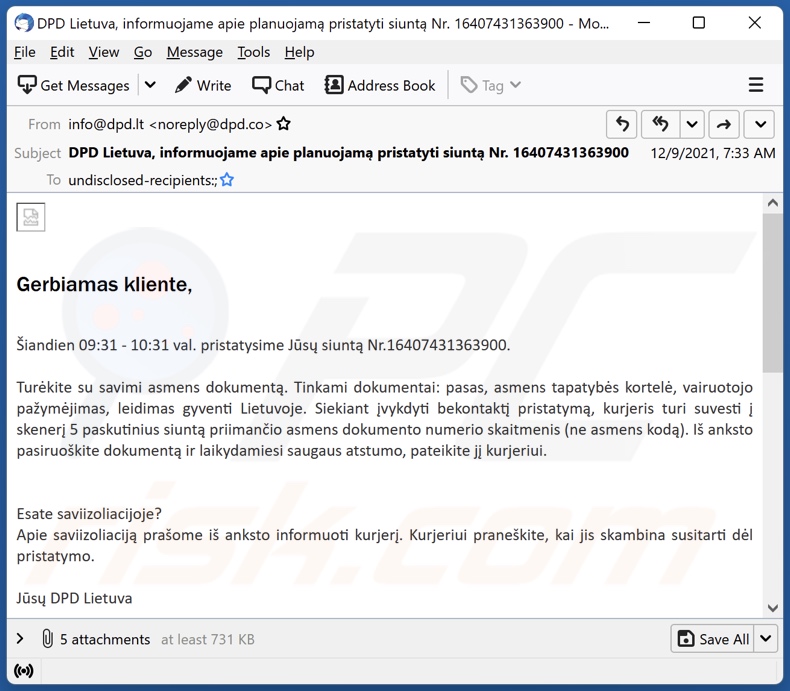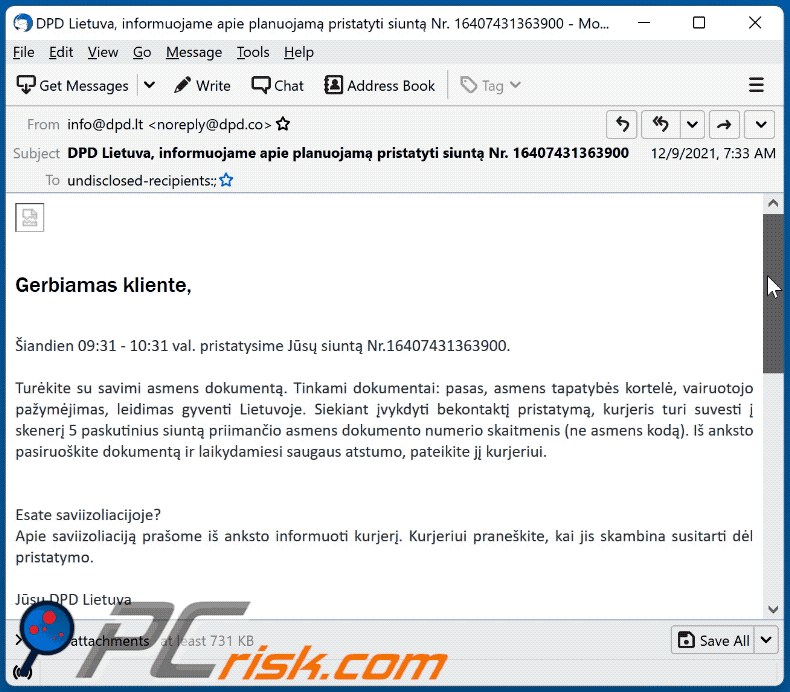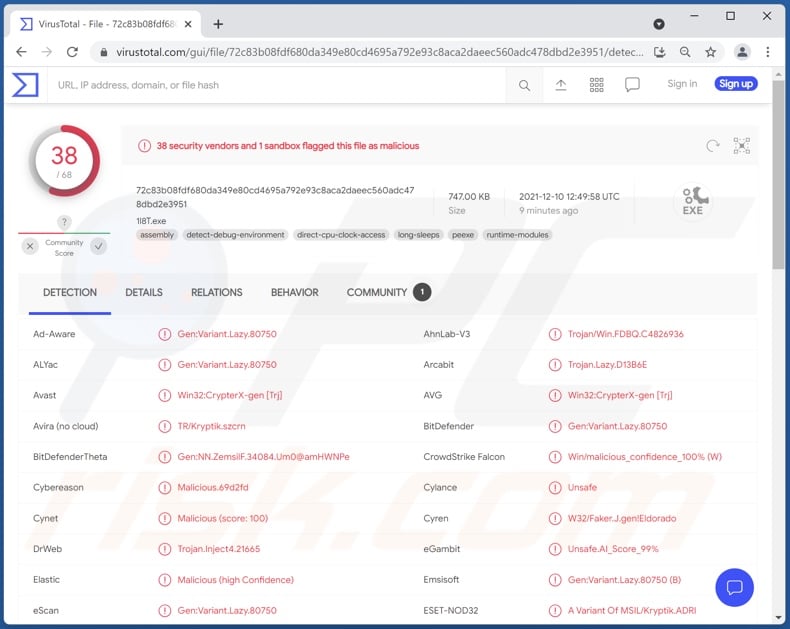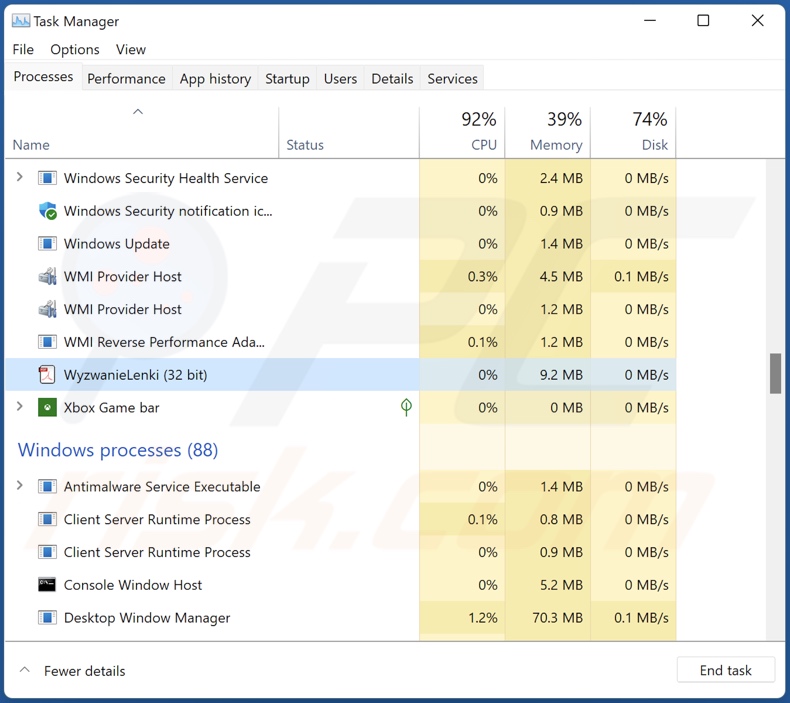Avoid infecting your system with malware via fake "DPD Lietuva" emails
Phishing/ScamAlso Known As: DPD Lietuva spam
Get free scan and check if your device is infected.
Remove it nowTo use full-featured product, you have to purchase a license for Combo Cleaner. Seven days free trial available. Combo Cleaner is owned and operated by RCS LT, the parent company of PCRisk.com.
What is "DPD Lietuva" email virus?
"DPD Lietuva email virus" refers to a malware-spreading spam campaign targeting Lithuanian users. The spam emails are disguised as delivery notifications from DPD Lietuva - the Lithuanian branch of DPDgroup, an international parcel delivery service network.
It must be emphasized that these emails are in no way associated with DPDgroup. This scam mail aims to infect recipients' systems with malware through the virulent attachments distributed through them.

"DPD Lietuva" email virus overview
The "DPD Lietuva" spam emails inform recipients of the estimated time for parcel delivery. These letters instruct on the reception process, such as the necessity of an identification document during parcel handover.
The recipients are told that they will have to provide the last five digits of their ID card; this does not refer to their Personal Code (Asmens kodas) but rather the card's/document's number. The fake emails also provide instruction for those who are in self-isolation.
As mentioned in the introduction, these letters are illegitimate. The files attached to them are infectious, and upon opening - begin downloading/installing malware.
Malware infections can cause a wide variety of damage, depending on the malicious program's capabilities and the cyber criminals' modus operandi.
For example, the term "trojan" refers to malware with a broad range of functionalities. Trojans can be used to cause chain infections (i.e., download/install additional malware), enable remote control over the device (RATs - Remote Access Trojans), download files and data from the system, extract information from browsers and other installed apps (e.g., browsing data, personally identifiable details, account usernames/passwords, credit card numbers, etc.), spy (e.g., record the desktop, keystrokes, audio/video via microphones and cameras, etc.), and so on.
Ransomware is designed to encrypt data and/or lock the device's screen - to make ransom demands for the decryption/ access recovery. Cryptominers operate by abusing system resources (potentially to the point of permanent hardware damage) to generate cryptocurrency.
To summarize, trusting the "DPD Lietuva" scam emails may result in multiple system infections, permanent data loss, severe privacy issues, financial losses, and identity theft.
| Name | DPD Lietuva spam |
| Threat Type | Trojan, password-stealing virus, banking malware, spyware. |
| Hoax | Scam emails supposedly concern parcel delivery. |
| Disguise | Scam emails are disguised as messages from DPD Lietuva - the Lithuanian branch of DPDgroup |
| Detection Names (attachment) |
Avast (Win32:CrypterX-gen [Trj]), Combo Cleaner (Gen:Variant.Lazy.80750), ESET-NOD32 (A Variant Of MSIL/Kryptik.ADRI), Kaspersky (HEUR:Trojan.MSIL.Taskun.gen), Microsoft (Trojan:MSIL/AgentTesla.DRH!MTB), Full List Of Detections (VirusTotal) |
| Symptoms | Trojans are designed to stealthily infiltrate the victim's computer and remain silent, and thus no particular symptoms are clearly visible on an infected machine. |
| Malicious Process Name | WyzwanieLenki (process name may vary) |
| Distribution methods | Infected email attachments, malicious online advertisements, social engineering, software 'cracks'. |
| Damage | Stolen passwords and banking information, identity theft, the victim's computer added to a botnet. |
| Malware Removal (Windows) |
To eliminate possible malware infections, scan your computer with legitimate antivirus software. Our security researchers recommend using Combo Cleaner. Download Combo CleanerTo use full-featured product, you have to purchase a license for Combo Cleaner. 7 days free trial available. Combo Cleaner is owned and operated by RCS LT, the parent company of PCRisk.com. |
Spam campaigns in general
"TurboTax Email Virus", "BBB Email Virus", "BBVA Bank Email Virus", and "Craiglist Email Virus" are some examples of malware-proliferating spam mail. Furthermore, these emails are also used for phishing and other scams.
Spam letters are usually presented as "urgent", "important", "priority", and similar; they are often disguised as messages from genuine entities as well. Due to how widespread spam mail is, it is strongly advised to exercise caution with incoming emails and messages.
How did "DPD Lietuva" email virus infect my computer?
Systems are infected via malicious files attached to and/or linked inside spam emails. These files can be executables (.exe, .run, etc.), archives (RAR, ZIP, etc.), PDF and Microsoft Office documents, JavaScript, and so on. When the files are opened - the infection chain is triggered.
For example, Microsoft Office documents cause infections by executing malicious macro commands. This occurs when a document is opened in pre-2010 Microsoft Office versions. Newer versions have "Protected View" mode that prevents automatic macro execution; instead, users can manually enable macro commands (i.e., editing/content). It is noteworthy that virulent documents can contain messages designed to trick users into allowing macros.
How to avoid installation of malware?
It is advised against opening suspicious and irrelevant emails. The attachments and links present in these letters - must not be opened, as they can cause system infections. It is recommended to use Microsoft Office versions released after 2010.
Aside from spam mail, malware is also proliferated via dubious download channels (e.g., unofficial and freeware sites, Peer-to-Peer sharing networks, etc.), illegal activation tools ("cracks"), and fake updates. Therefore, it is crucial to always download from official/verified sources and activate/update tools provided by genuine developers.
Furthermore, it is paramount to have a reputable anti-virus installed and kept up-to-date. This software has to be used to run regular system scans and to remove detected threats. If you've already opened "DPD Lietuva email virus" attachment, we recommend running a scan with Combo Cleaner Antivirus for Windows to automatically eliminate infiltrated malware.
Text presented in the "DPD Lietuva" scam email letter:
Subject: DPD Lietuva, informuojame apie planuojamą pristatyti siuntą Nr. 16407431363900
Gerbiamas kliente,
Šiandien 09:31 - 10:31 val. pristatysime Jūsų siuntą Nr.16407431363900.
Turėkite su savimi asmens dokumentą. Tinkami dokumentai: pasas, asmens tapatybės kortelė, vairuotojo pažymėjimas, leidimas gyventi Lietuvoje. Siekiant įvykdyti bekontaktį pristatymą, kurjeris turi suvesti į skenerį 5 paskutinius siuntą priimančio asmens dokumento numerio skaitmenis (ne asmens kodą). Iš anksto pasiruoškite dokumentą ir laikydamiesi saugaus atstumo, pateikite jį kurjeriui.
Esate saviizoliacijoje?
Apie saviizoliaciją prašome iš anksto informuoti kurjerį. Kurjeriui praneškite, kai jis skambina susitarti dėl pristatymo.
Jūsų DPD Lietuva
Jūsų siuntų pristatymo partneris,
DPD Lietuva
Šioje žinutėje ir/ar jos prieduose pateikiama informacija yra skirta tik nurodytam adresatui ir gali būti konfidenciali. Jeigu ši žinutė pasiekė Jus per klaidą, ji negali būti naudojama, platinama, skaitoma, persiunčiama, kopijuojama ar kaip kitaip skleidžiama. Tokiu atveju, prašome šią žinutę ištrinti ir apie tai pranešti siuntėjui elektroniniu paštu.
Appearance of the "DPD Lietuva" scam email (GIF):

Screenshot of VirusTotal detections of the malicious attachment distributed via "DPD Lietuva" spam campaign:

Screenshot of the malicious process on Windows Task Manager ("WyzwanieLenki"):

Instant automatic malware removal:
Manual threat removal might be a lengthy and complicated process that requires advanced IT skills. Combo Cleaner is a professional automatic malware removal tool that is recommended to get rid of malware. Download it by clicking the button below:
DOWNLOAD Combo CleanerBy downloading any software listed on this website you agree to our Privacy Policy and Terms of Use. To use full-featured product, you have to purchase a license for Combo Cleaner. 7 days free trial available. Combo Cleaner is owned and operated by RCS LT, the parent company of PCRisk.com.
Quick menu:
- What is DPD Lietuva spam?
- Types of malicious emails.
- How to spot a malicious email?
- What to do if you fell for an email scam?
Types of malicious emails:
![]() Phishing Emails
Phishing Emails
Most commonly, cybercriminals use deceptive emails to trick Internet users into giving away their sensitive private information, for example, login information for various online services, email accounts, or online banking information.
Such attacks are called phishing. In a phishing attack, cybercriminals usually send an email message with some popular service logo (for example, Microsoft, DHL, Amazon, Netflix), create urgency (wrong shipping address, expired password, etc.), and place a link which they hope their potential victims will click on.
After clicking the link presented in such email message, victims are redirected to a fake website that looks identical or extremely similar to the original one. Victims are then asked to enter their password, credit card details, or some other information that gets stolen by cybercriminals.
![]() Emails with Malicious Attachments
Emails with Malicious Attachments
Another popular attack vector is email spam with malicious attachments that infect users' computers with malware. Malicious attachments usually carry trojans that are capable of stealing passwords, banking information, and other sensitive information.
In such attacks, cybercriminals' main goal is to trick their potential victims into opening an infected email attachment. To achieve this goal, email messages usually talk about recently received invoices, faxes, or voice messages.
If a potential victim falls for the lure and opens the attachment, their computers get infected, and cybercriminals can collect a lot of sensitive information.
While it's a more complicated method to steal personal information (spam filters and antivirus programs usually detect such attempts), if successful, cybercriminals can get a much wider array of data and can collect information for a long period of time.
![]() Sextortion Emails
Sextortion Emails
This is a type of phishing. In this case, users receive an email claiming that a cybercriminal could access the webcam of the potential victim and has a video recording of one's masturbation.
To get rid of the video, victims are asked to pay a ransom (usually using Bitcoin or another cryptocurrency). Nevertheless, all of these claims are false - users who receive such emails should ignore and delete them.
How to spot a malicious email?
While cyber criminals try to make their lure emails look trustworthy, here are some things that you should look for when trying to spot a phishing email:
- Check the sender's ("from") email address: Hover your mouse over the "from" address and check if it's legitimate. For example, if you received an email from Microsoft, be sure to check if the email address is @microsoft.com and not something suspicious like @m1crosoft.com, @microsfot.com, @account-security-noreply.com, etc.
- Check for generic greetings: If the greeting in the email is "Dear user", "Dear @youremail.com", "Dear valued customer", this should raise suspiciousness. Most commonly, companies call you by your name. Lack of this information could signal a phishing attempt.
- Check the links in the email: Hover your mouse over the link presented in the email, if the link that appears seems suspicious, don't click it. For example, if you received an email from Microsoft and the link in the email shows that it will go to firebasestorage.googleapis.com/v0... you shouldn't trust it. It's best not to click any links in the emails but to visit the company website that sent you the email in the first place.
- Don't blindly trust email attachments: Most commonly, legitimate companies will ask you to log in to their website and to view any documents there; if you received an email with an attachment, it's a good idea to scan it with an antivirus application. Infected email attachments are a common attack vector used by cybercriminals.
To minimise the risk of opening phishing and malicious emails we recommend using Combo Cleaner Antivirus for Windows.
Example of a spam email:

What to do if you fell for an email scam?
- If you clicked on a link in a phishing email and entered your password - be sure to change your password as soon as possible. Usually, cybercriminals collect stolen credentials and then sell them to other groups that use them for malicious purposes. If you change your password in a timely manner, there's a chance that criminals won't have enough time to do any damage.
- If you entered your credit card information - contact your bank as soon as possible and explain the situation. There's a good chance that you will need to cancel your compromised credit card and get a new one.
- If you see any signs of identity theft - you should immediately contact the Federal Trade Commission. This institution will collect information about your situation and create a personal recovery plan.
- If you opened a malicious attachment - your computer is probably infected, you should scan it with a reputable antivirus application. For this purpose, we recommend using Combo Cleaner Antivirus for Windows.
- Help other Internet users - report phishing emails to Anti-Phishing Working Group, FBI’s Internet Crime Complaint Center, National Fraud Information Center and U.S. Department of Justice.
Frequently Asked Questions (FAQ)
Why did I receive this email?
Thousands of users receive the same spam email. Cyber criminals distribute this mail through mass-scale operations with the hopes that at least some of the recipients will fall for their scam.
I have read the "DPD Lietuva" spam email but didn't open the attachment, is my computer infected?
No, simply opening a spam email will not initiate any infection processes. Malware download/installation is jumpstarted by opening/clicking the attachments and links present in this mail.
I have downloaded and opened the file attached to the "DPD Lietuva" spam email, is my computer infected?
If the opened file was an executable - most likely, yes. However, if it was a document (e.g., .doc, .pdf, etc.) - you might have avoided triggering an infection. In some cases, these formats require additional actons (e.g., enabling macro commands) - to start downloading/installing malicious software.
My computer is infected with malware, should I format my storage device to get rid of it?
No, such drastic measures are unnecessary.
What are the biggest issues that malware can cause?
What harm a malware infection can cause - depends on the program's abilities and the cyber criminals' aims. In general, system infections can result in diminished system performance or failure, permanent data loss, hardware damage, serious privacy issues, financial losses, and identity theft.
What is the purpose of malware?
Most malware infections have the sole purpose of generating revenue for the cyber criminals. However, other aims might include: political/geopolitical motivations, personal reasons (i.e., targeted specific victims), disruption of certain (e.g., website, service, company, etc.) processes, cyber criminals' amusement, and so forth.
Will Combo Cleaner remove malware infections present in email attachments?
Yes, Combo Cleaner can detect and eliminate most of the known malware infections. It is noteworthy that sophisticated malicious software tends to hide deep within systems. Therefore, performing a complete system scan is crucial.
Share:

Tomas Meskauskas
Expert security researcher, professional malware analyst
I am passionate about computer security and technology. I have an experience of over 10 years working in various companies related to computer technical issue solving and Internet security. I have been working as an author and editor for pcrisk.com since 2010. Follow me on Twitter and LinkedIn to stay informed about the latest online security threats.
PCrisk security portal is brought by a company RCS LT.
Joined forces of security researchers help educate computer users about the latest online security threats. More information about the company RCS LT.
Our malware removal guides are free. However, if you want to support us you can send us a donation.
DonatePCrisk security portal is brought by a company RCS LT.
Joined forces of security researchers help educate computer users about the latest online security threats. More information about the company RCS LT.
Our malware removal guides are free. However, if you want to support us you can send us a donation.
Donate
▼ Show Discussion